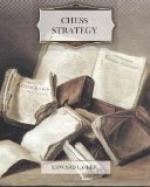24. ... Q-Q2 25. R-K 3 Resigns
A wonderful game in which Teichmann, the great judge of position, proves himself also a master in hand-to-hand fighting, in the wild chaos of sacrificial combinations.
Game No. 14
White: Spielmann. Black: Tarrasch.
Ruy Lopez (see p. 41).
1. P-K4 P-K4 2. Kt-KB3 Kt-QB3 3. B-Kt5 P-QR3 4. B-R4 Kt-B3 5. Castles Kt-P 6. P-Q4
--------------------------------------- 8 | #R | | #B | #Q | #K | #B | | #R | |---------------------------------------| 7 | | #P | #P | #P | | #P | #P | #P | |---------------------------------------| 6 | #P | | #Kt| | | | | | |---------------------------------------| 5 | | | | | #P | | | | |---------------------------------------| 4 | ^B | | | ^P | #Kt| | | | |---------------------------------------| 3 | | | | | | ^Kt| | | |---------------------------------------| 2 | ^P | ^P | ^P | | | ^P | ^P | ^P | |---------------------------------------| 1 | ^R | ^Kt| ^B | ^Q | | ^R | ^K | | --------------------------------------- A B C D E F G H
Diag. 120
In a game between Riga and Berlin PxP was tried for the first time, a bold venture which anticipates White’s desire to open the King’s file. After 7. R-K1 Black can defend the Kt by P-Q4, but after 8. KtxP White threatens again to win the Kt by P-KB3, besides attacking the QKt a second time. However, Black has a surprising answer in readiness. He initiates a violent counter attack which keeps White busy until Black, by castling, escapes the dangers of the double pin. (Compare Game No. 17.)
6.
... P-QKt4
7.
B-Kt3 P-Q4
8.
P-QR4
This gives Black an opportunity of disposing of his QKt by exchanging it, thereby enabling him to round off his pawn position by P-QB4, at the same time threatening to cut off the Bishop by P-B5. 8. PxP followed by P-B3 is the natural continuation, as shown in the first part of this book, because the Bishop, retreating to B2, can operate on a useful diagonal.
8. ... QKtxP!
QR-Kt1 would not be so good, because White obtains an open file for his Rook. The move in the text is an absolutely valid defence, as was proved by Schlechter in his match against Lasker.
9. KtxKt PxKt
10. Kt-B3
PxP and P-B3 seems a more natural continuation.
10. ... KtxKt
Not PxKt, on account of BxP.
11. PxKt P-QB4 12. RPxP B-K2
in order to castle in reply to B-R4.
13. Q-B3
Here White should have got back his second pawn by PxQP. If then 13. ... P-B5; 14. B-R4, Castles; 15. PxP, BxP, White plays P-QB3, providing a retreat for his R or B. After the move in the text this manoeuvre becomes impossible, because the B after P-B3 can be attacked twice but has lost the support of the Queen.




